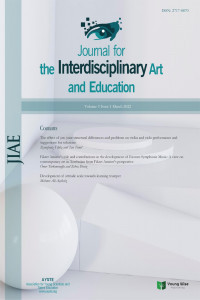Examination of the progressive aspects of the piano etude genre of Russian composers
Examination of the progressive aspects of the piano etude genre of Russian composers
A. Skryabin, S.Rakhmaninov, S. Lyapunov, A. Rubinstein, Piano etudes, Genre Composers,
___
- Alekseev, A.D. (1982). История фортепианного искусства (The History of Piano Art). Moscow, Music.
- Aranovsky, M.G. (1963). Этюды-картины Рахманинова (Rachmaninoff's Etudes-Tableaux). Moscow, State Music Publication.
- Arensky, A. S. (1976). Этюды для фортепиано (Etudes for piano). Moscow.
- Arensky, A. S. (2002). 10 этюдов для фортепиано (10 etudes for piano). Russia, Musicaneo.
- Blagoy, D.E. (1963). Этюды Скрябина (Etudes of Scriabin). Moscow: State Music Publication.
- Bryantseva, V.N. (1976). С.В.Рахманинов (S.V.Rachmaninoff). Moscow, Soviet composer.
- Glazunov, A. (1968). Этюды для фортепиано (Etudes for piano). Moscow. https://primanota.ru/glazunov-aleksandr/3-etyuda-dlya-fortepiano.htm
- Keldysh, Y. (1978). Глазунов И.С. Фортепианное творчество (Piano etudes of A.Glazunov). Moscow. https://www.belcanto.ru/glazunov_pianomusic.html
- Lukachevskaya, M.L. (2014). Фортепианный стиль С.М.Ляпунова. (S.M. Lyapunov's piano style). Nizhny-Novqorod: Conservatory of Nizhny Novqorod.
- Lyapunov, S.M. (1968). Piyano için etütler. Moskova. (Lyapunov, S.M. (1968). Etudes for piano. Moscow.) //https://primanota.ru/lyapunov-sergei-mixailovich/12-transcendentnyx-etyudov-dlya-fortepiano-sheets.htm
- Nikolaeva-Scheffler, N.B. (2015). Педагогические проблемы освоения творческого наследия Рахманинова на междисциплинарном уровне (на примере Этюдов-картин ор.39) (Pedagogical problems of mastering Rachmaninoff's creative legacy at the interdisciplinary level (Op.39 on the example of Etudes-Tableaux). http://nikolayeva.com/wp-content/uploads/2015/12
- Pokrovskaya, I.E. (2007). Особенности фортепианного стиля А.С.Аренского (Characteristics of A.Arensky's piano style). Russia, News journal, pp.214-217). https://cyberleninka.ru/article/n/osobennosti-fortepiannogo-stilya-a-s-arenskogo
- Rachmaninoff, S.V. (1973). Этюд-картины (Etudes-Tableaux, Op.33.). Moscow. https://primanota.ru/raxmaninov-sergei/etyudy-kartiny-op33-sheets.htm
- Rachmaninoff, S.V. (1973). Этюд-картины (Etudes-Tableaux, Op.39.). Moscow. https://primanota.ru/raxmaninov-sergei/etyudy-kartiny-op39-sheets.htm
- Rubinstein, A.G. (1969). Концертный этюд (Concert Etude). Moscow. https://pianokafe.com/music/anton-rubinshteyn-kontsertnyy-etyud/
- Rubinstein, A.G. (1969). Этюд «Ундина» Oр.1 (Etude “Undine” Op. 1.). Moscow. http://ru.scorser.com/Out/4774990.html
- Rubinstein, A.G. (1969). Этюд Op.81, №1 (Etude Op. 81, №1). Moscow. https://notes4sintez.ru/publ/3016/rubinshteyn-anton-grigorevich/10838-rubinshteyn-anton-grigorevich-etyud-op81-1.html
- Rubinstein, A.G. (1969). Этюд Oр.23 № 3 (Etude Op. 23, № 3.) Moscow. https://sheets-piano.ru /wp- op.23-%E2%84%963.pdf
- Scriabin, A. H. (1981). Этюды для фортепиано Op.8 (Etudes for piano. Op. 8). Leningrad: Music. https://www.musicaneo.com/ru/sheetmusic/sm-22148_dvenadcat_etyudov_op_8.html
- Scriabin, A.H. (1981) Этюды для фортепиано (Etudes for piano). Leningrad: Music.
- Terentyeva, N.A. (1999). Карл Черни и его этюды (Carl Czerni and his etudes). Saint-Petersburg, Composer.
- Yayın Aralığı: Yılda 4 Sayı
- Başlangıç: 2020
- Yayıncı: Genç Bilge Yayıncılık
A study on developing the evaluation scale of the polyphonic choir curriculum
Gülay LAÇİN, İlknur ÖZAL GÖNCÜ
Examination of the progressive aspects of the piano etude genre of Russian composers
A new model for the teaching violin to young learners
Comparison of right-hand playing techniques used in flamenco guitar and baglama
